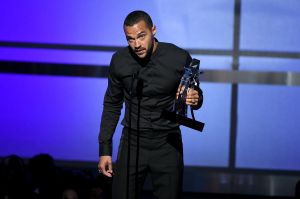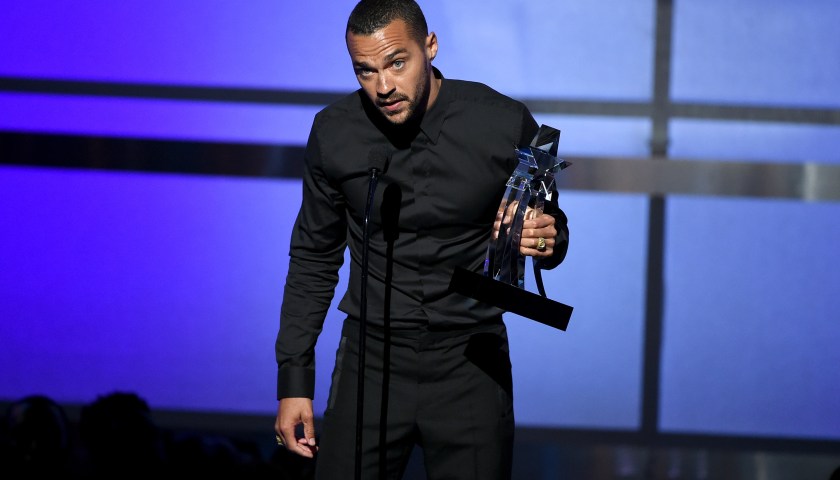
Source: Kevin Winter/BET / Getty
Matty Willz:
Sunday night was a special one for modern America.
Jesse Williams (34, best known for his role as Dr. Jackson Avery on Grey’s Anatomy) was awarded BET’s Humanitarian Award – then delivered an acceptance speech for the ages. Williams is an activist as well as an actor, serving on the board of directors for The Advancement Project – a group created to “develop and inspire community-based solutions based on the same high quality analysis and public education campaigns that produced the landmark civil rights victories of earlier eras.” He and his wife have also started a production company called Question Bridge: Black Males, a project with the goal of addressing and redefining African American male identity in America.
After a few formalities that included thanking the higher-ups at BET, shouting out his parents and showering his wife with love for “changing (his) life”, Williams got right to it.
“Now, this award, this is not for me. This is for the real organizers all over the country, the activists, the civil rights attorneys, the struggling parents, the families, the teachers, the students, that are realizing that a system built to divide, impoverish and destroy us cannot stand if we do. It’s kind of basic mathematics: the more we learn about who we are and how we got here, the more we will mobilize.”
It’s clear that Williams isn’t enamored by the raised pedestal he suddenly stands on. Instead, he immediately disperses the recognition for this achievement by pointing out who he believes to be the “real organizers”. The fact is that Williams understands that there are thousands of activists who will always be overlooked by glitzy award shows, and he was letting them all know that they aren’t forgotten.

Just as quickly as he recognizes the common folk for their dedication to service, he also draws the line in the sand between social/racial injustice and political correctness – and proudly stomps over it. He calls out “a system built to divide, impoverish and destroy” so that we all knew exactly where he was heading. He summarizes his intro with a promise. That same system “built to destroy us” – according to Jesse Williams – “cannot stand if we do.”
The tone was set.
“Now this is also in particular for the Black women who have spent their lifetimes dedicated to nurturing everyone before themselves. We can and will do better for you. What we’ve been doing is looking at the data, and we know that police somehow manage to de-escalate, disarm and not kill white people everyday. So what’s going to happen is we are gonna have equal rights and justice in our own country or we will restructure their function and ours.”
Think of all the grandmothers you know who’s home has become a revolving door for family members to live in. Think of all the countless and thankless jobs our mothers, aunts, grandmothers, and sisters undertake – not to be appreciated or marveled at – but to simply provide comfort and love for the persons involved in each situation. They rarely ask for much and they’re often forgotten.
Not on this night. Not by Jesse Williams.
The second half of this section was dedicated directly to the law enforcement and the protectors of law enforcement, as the last half decade in American history is marred with slayings of young black men by white police. Williams was letting the world know that the data is being analyzed, that they won’t be able to tell us that blacks and whites are being killed by cops at the same rate that they claim. Williams was letting white law enforcement know that we aren’t stupid, and that change is coming, whether the world believes it or not.
“Now…” [Standing Ovation]
“I got more, y’all. Yesterday would’ve been young Tamir Rice’s 14th birthday, so I don’t want to hear anymore about how far we’ve come when paid public servants can pull a drive-by on a 12-year-old playing alone in a park in broad daylight, killing him on television and then going home to make a sandwich.”
This is where you could start to hear the genuine anger – and sadness – in his voice.
Williams was just announcing something that we all know – when a cop can kill a black kid without repercussion then the system is obviously flawed. His “(go) home to make a sandwich” line just punctuated that absurdness.
“There has been no war that we have not fought and died on the front lines of. There is no job we haven’t done, there is no tax they haven’t levied against us and we’ve paid all of them. But freedom is somehow always conditional here. “You’re free!” they keeping telling us. “But she would be alive if she hadn’t acted so…free.” Now, freedom is always coming in the hereafter, but, you know what, though? The hereafter is a hustle. We want it now.”
This is when it starts to get really good.
He opens by accurately proclaiming that black people have fought in every war this country has been a part of. When it’s convenient for White America to use us for their benefit then we are all-of-a-sudden-citizens.
“You’re free!, they keep telling us. But she would be alive if she hadn’t acted so… free.”
When they don’t see us as a benefit, or when our paths cross and we aren’t appropriate for their current endeavor, then often times over history our lives become worthless. The truth is black people have never been free here. Even after slavery we walk around having to defend ourselves at every turn. Our fashion. Our appearance. Our lives. Jesse Williams stood on that stage and demanded real freedom, and he wants it right now.
“Tell Rekia Boyd how it’s so much better to live in 2012 than it is to live in 1612 or 1712. Tell that to Eric Garner, Sandra Bland. Tell that to Dorian Hunt. The thing is, though, all of us here are getting money. That alone isn’t going to stop this. Alright? Dedicating our lives to getting money just to give it right back for someone’s brand on our body — when we spent centuries praying with brands on our bodies and now we pray to get paid for brands on our bodies?”
In this passage Williams takes the ugliness of America, dusts it off, and punches it right through our eyes and ears into our hearts and brains. He passively addresses the people who stand in ignorance thinking that racism in America is somehow dulled, and dispels the rumor that black people in America are better off today than we were hundreds of years ago.
Pay attention to the second half of this. . .
“Dedicating our lives to getting money just to give it right back for someone’s brand on our body –
Black people are so concerned with getting money that we sometimes forget, or just plainly don’t know, what we should do with it once we get it. So instead of saving, building or investing we become puppets, mules for people with even more money. We spend all our hard earned money on name brand clothing, something that has next to zero in resale value and is almost rendered worthless to anyone besides the original owner the moment it’s purchased.
– when we spent centuries praying with brands on our bodies
Slaves were branded by slave owners as punishment, mainly for attempting to escape.
and now we pray to get paid for brands on our bodies?”
Again, those of us who pray for money sometimes go out and blow it on clothing and other name brand material items that don’t help us in our real life.
“And, let’s get a couple of things straight. This is a little side note: the burden of the brutalized is not to comfort the bystander — that’s not our job, alright? Stop with all that. If you have a critique for our resistance, then you’d better have an established record of critique of our oppression. If you have no interest in equal rights for Black people, then do not make suggestions to those who do. Sit down.”
This is the most notable moment of his speech.
“The burden of the brutalized is not to comfort the bystander.”
We don’t have to apologize to our attackers for talking about us being their victims. It’s not our job to make them feel less ugly. We don’t owe them shit.
The last two sentences of this passage lends itself to the ‘This is an A and B conversation, so C yourself out.’
“If you have a critique for our resistance, then you’d better have an established record of critique of our oppression. If you have no interest in equal rights for Black people, then do not make suggestions to those who do.”
To put it bluntly – if you aren’t or haven’t been a part of the conversation reflecting on the negatives that black people have had to deal with – if you aren’t active in conversations about where we come from, what we fought through or what we have overcome – then don’t be the one suggesting what we should do to get where we intend to go. Don’t complain about our plan if you haven’t been a dedicated voice in the room dictating why we’re even in pain in the first place. We’re not asking you for help, and if you want to help and it’s not coming from a place that is love or understanding, then don’t lend us your help at all.
“We’ve been floating this country on credit for centuries, yo, and we’re done watching and waiting while this invention called whiteness uses and abuses us, burying Black people out of sight and out of mind while extracting our culture, our dollars, our entertainment like oil — Black gold! — ghettoizing and demeaning our creations and stealing them, gentrifying our genius and then trying us on like costumes before discarding our bodies like rinds of strange fruit.”
Of every word Jesse Williams spoke on Sunday night, these will be the ones that live forever.
The “floating this country on credit for centuries” speaks to the reparations that have been ‘owed’ to black folks forever. Hold your breath if you want to.
The “invention called whiteness” line was interesting to me. When you think about it the, absolute main reason there is racism in this country is because of slavery, when white people thought themselves important enough to enslave those with a different color skin. Thus, ‘whiteness’ is an invention created by white people that enables them to engage in life’s finer things without fear of opposition or disdain.
The rest of this portion speaks to black as a brand. A brand that’s used by certain people to sell their product. When you think about the impact of our music, our fashion, our slang and our look, you suddenly realize that blackness is everywhere. At least the portions of it that are trendy or marketable. Once they squeeze every penny out of said black idea then they simply move onto the next big thing.
Williams understands the bigger picture, and he wanted to make sure everyone else does too.
“The thing is, though, that…just because we’re magic doesn’t mean we’re not real. Thank you.”
A precise closing to an uplifting and enlightening speech. And while there may have been a bit of ‘preaching to the choir’ going on (as he did stand and preach to essentially what was a room full of black people), the impact was felt further than the auditorium of which he was speaking.
If he’s changed one mind with his words, if he’s managed to convince one black person to think twice about a financial decision that they’ll make or if he’s encouraged one judge to eventually punish one bad cop for an inevitable misuse of power – then Jesse Wesley Williams did his damn job.

Follow Matty Willz on Facebook/IAmMattyNice
Follow Matty Willz on IG and Twitter @MattyWillz_23

A Breakdown of Jesse Williams’ Epic Acceptance Speech was originally published on zhiphopcleveland.com















